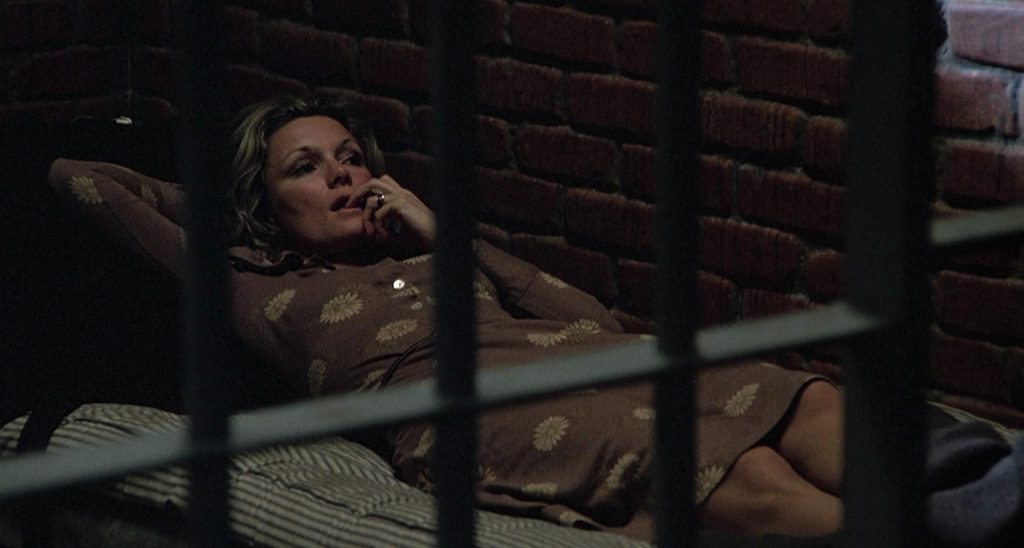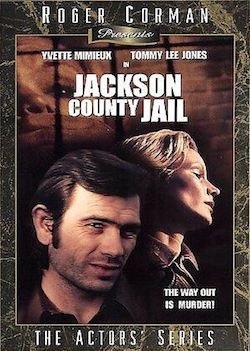
Jackson County Jail (USA, 1976) 89 min color DIR: Marvin Miller. SCR: Donald Stewart. PROD: Jeff Begun. MUSIC: L. Loren Newkirk. DOP: Bruce Logan. CAST: Yvette Mimieux, Tommy Lee Jones, Howard Hesseman, Robert Carradine, Severn Darden, Mary Woronov, Hal Needham, Betty Thomas. (New World Pictures)

Jackson County Jail earned some favourable reviews for its “feminist themes”, and because it has more three-dimensional performances than one usually sees in movies of this type, but it’s exploitation all the same. Yvette Mimieux (perhaps best remembered from 1960’s The Time Machine) is very good as Dinah Hunter, an ad exec who leaves her philandering husband (Howard Hesseman!) and travels from LA to New York to a new job, and a new life. Her decision to travel by car instead of by plane (“to see the America that I never see up in the air”) is one that she soon regrets. After being robbed, stranded and then accused of theft, she is locked up at the Jackson County Jail, and raped by a law officer (who is naturally portrayed as a mentally handicapped half-wit). She escapes with another prisoner (Tommy Lee Jones, memorable in an early role) and they are pursued by police.
This has been acclaimed for its central theme of a woman rising above obstacles constructed by a man’s world. In that regard, one could compare it to Barbara Loden’s classic independent film, Wanda (1970), in which a woman must rely on an abusive jerk to get through life, as she has no skills or means of her own. In Jackson, a professional female suffers a similar fate, because every male she meets is a pig: from her adulterous husband to the slimy state troopers, and even in smaller parts like some lecher in a diner. Jones’ Coley Blake character is the sole exception to this strategy, if only because he treats her with slightly more dignity than any other man. Wanda is a brutally honest portrayal of a modern woman who cannot survive without a man. Jackson on the other hand feels more like a male’s assumptions of the female’s bleak prospects in the world. The effect is similar to Henry Jaglom’s work, in which a male’s perception of an honest “women’s picture” is to have them do nothing but discuss their menstrual cycles. In other words, when male writers and directors attempt to make a “truthful” picture about women, they often result in a movie with an exaggerated stereotype instead of anything original.
Still, this manipulative movie is quite compelling viewing, at first. But when Jones enters the picture, the movie dwindles to routine “good ole boy on the lam” caricature, and drowns in its own self-important rhetoric. This film stands out from much of Roger Corman’s other New World releases, because it features former and future A-list stars, but when Tommy and Yvette go to his hideout to meet his accomplices, and we see one of them is played by Mary Woronov, we’re back in Corman country. New World had certainly released exploitation films that also succeeded in being topical, yet this movie’s attempt to have it both ways doesn’t quite work. Seen today, Jackson County Jail remains an interesting conversation piece, but it probably will feel more manipulative than “important”. It does however have an interesting climax, which crosscuts the fugitives being hunted by the police with shots of a small-town, all-American parade. It is a perfectly Satanic ending, depicting the hypocrisy of America. Curiously, Mimieux and director Marvin Miller re-teamed two years later, for a TV movie remake! As of this writing, I’ve yet to see it, but the mind reels at what that concoction must have been.
Jackson County Jail was released to VHS by Warner Brothers, and Shout! Factory released it to DVD, paired with Caged Heat, as part of its Roger Corman’s Cult Classics collection, in which they did bang-up jobs in presenting many of Corman’s New World pictures in their original glory.
